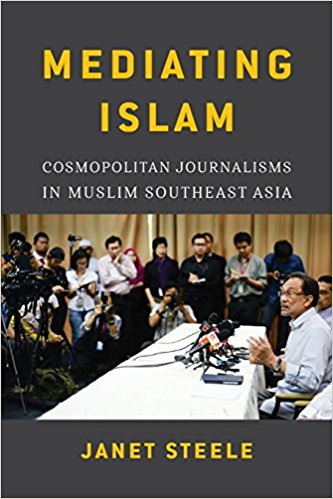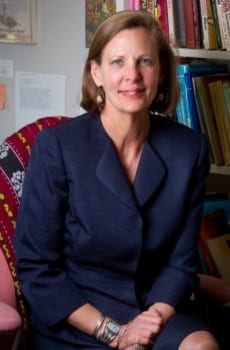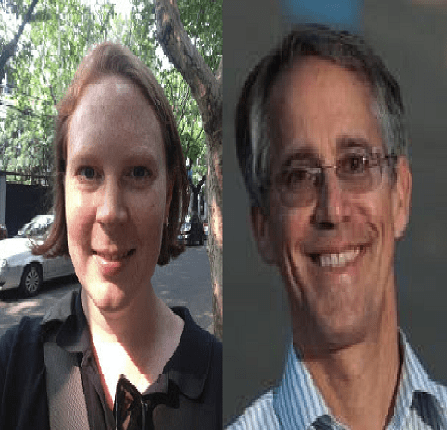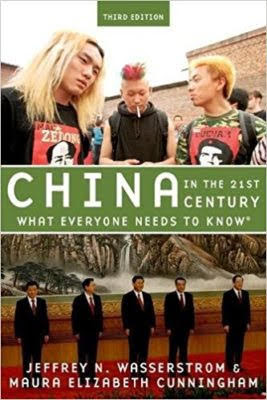Audio Recording Part 1
Audio Recording Part 2
Wednesday, April 11, 2018
12:00 PM – 2:00 PM
The Elliott School of International Affairs
1957 E Street, NW, Lindner Family Commons, Room 602
Washington, DC 20052

Broadening an overly narrow definition of Islamic journalism, Janet Steele examines day-to-day reporting practices of Muslim professionals, from conservative scripturalists to pluralist cosmopolitans, at five exemplary news organizations in Malaysia and Indonesia. At Sabili, established as an underground publication, journalists are ed for their ability at dakwah, or Islamic propagation. At Tempo, a news magazine banned during the Soeharto regime and considered progressive, many see their work as a manifestation of worship, but the publication itself is not considered Islamic. At Harakah, reporters support an Islamic political party, while at Republika they practice a “journalism of the Prophet” and see Islam as a market niche. Other news organizations, too, such as Malaysiakini, employ Muslim journalists. Steele, a longtime scholar of the region, explores how these publications observe universal principles of journalism through an Islamic idiom.
This event is on the record and open to the media.
About the speaker:
 Dr. Janet Steele is an associate professor of journalism at the George Washington University and the director of the Institute for Public Diplomacy and Global Communication. She received her Ph.D. in History from the Johns Hopkins University and focus on how culture is communicated through the mass media.
Dr. Janet Steele is an associate professor of journalism at the George Washington University and the director of the Institute for Public Diplomacy and Global Communication. She received her Ph.D. in History from the Johns Hopkins University and focus on how culture is communicated through the mass media.
Dr. Steele is a frequent visitor to Southeast Asia where she lectures on topics ranging from the role of the press in a democratic society to specialized courses on narrative journalism. Her book, “Wars Within: The Story of Tempo, an Independent Magazine in Soeharto’s Indonesia,” focuses on “Tempo” magazine and its relationship to the politics and culture of New Order Indonesia. Awarded two Fulbright teaching and research grants, she has served as a State Department speaker-specialist in Indonesia, Malaysia, Vietnam, Cambodia, Brunei, the Philippines, East Timor, Taiwan, Burma, Sudan, Egypt, India and Bangladesh. The author of numerous articles on journalism theory and practice, her most recent book, “Email Dari Amerika,” (Email from America), is a collection of newspaper columns written in Indonesian and originally published in the newspaper Surya. Her most recent book is Mediating Islam, Cosmopolitan Journalisms in Muslim Southeast Asia.
Co-sponsored by the Sigur Center for Asian Studies and the Elliott School of International Affairs



 Jeffrey Wasserstrom is Chancellor’s Professor of History at the University of California, Irvine; Editor of the Journal of Asian Studies; a member of Dissent Magazine‘s editorial board; and an academic editor of the China Channel of the Los Angeles Review of Books. He has contributed commentaries and reviews to the New York Times, the Wall Street Journal, the Financial Times, and various other newspapers and to magazines. His other books include, as editor, The Oxford Illustrated History of Modern China (2016). He received his PhD from UC Berkeley.
Jeffrey Wasserstrom is Chancellor’s Professor of History at the University of California, Irvine; Editor of the Journal of Asian Studies; a member of Dissent Magazine‘s editorial board; and an academic editor of the China Channel of the Los Angeles Review of Books. He has contributed commentaries and reviews to the New York Times, the Wall Street Journal, the Financial Times, and various other newspapers and to magazines. His other books include, as editor, The Oxford Illustrated History of Modern China (2016). He received his PhD from UC Berkeley. Maura Cunningham is an Associate at the University of Michigan’s Lieberthal-Rogel Center for Chinese Studies and edits the #Asianow blog of the Association for Asian Studies. She has written on modern Chinese history for the Wall Street Journal, the Los Angeles Review of Books, Ms., World Policy Journal, and Time. A past editor of China Beat, she is an advising editor to the China Channel of the Los Angeles Review of Books. She received her PhD from UC Irvine.
Maura Cunningham is an Associate at the University of Michigan’s Lieberthal-Rogel Center for Chinese Studies and edits the #Asianow blog of the Association for Asian Studies. She has written on modern Chinese history for the Wall Street Journal, the Los Angeles Review of Books, Ms., World Policy Journal, and Time. A past editor of China Beat, she is an advising editor to the China Channel of the Los Angeles Review of Books. She received her PhD from UC Irvine.

 Ornit Shani is a scholar of politics and modern history of India. Her research focuses on the modern history of democracy and citizenship in India, as well as the rise of Hindu Nationalism, identity and caste politics, and communal and caste violence. Dr. Ornit was a Research Fellow at St. John’s College, Cambridge University and holds a PhD from the University of Cambridge. Her new book How India Became Democratic: Citizenship and the Making of the Universal Franchise explores the creation of the electoral roll and universal adult franchise in India. Dr. Shani’s other research interests include modern South Asia, democracy and democratization, India’s constitutionalism, India legal history, Indian elections, nationalism, and identity politics.
Ornit Shani is a scholar of politics and modern history of India. Her research focuses on the modern history of democracy and citizenship in India, as well as the rise of Hindu Nationalism, identity and caste politics, and communal and caste violence. Dr. Ornit was a Research Fellow at St. John’s College, Cambridge University and holds a PhD from the University of Cambridge. Her new book How India Became Democratic: Citizenship and the Making of the Universal Franchise explores the creation of the electoral roll and universal adult franchise in India. Dr. Shani’s other research interests include modern South Asia, democracy and democratization, India’s constitutionalism, India legal history, Indian elections, nationalism, and identity politics.